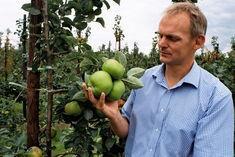
Increasing demand for English apples and pears, as well as predictions of good quality as the first of the crop is picked this week, have led to leading grower Adrian Scripps expressing confidence for the season.
The Kent-based independent grower has made a £1 million investment to expand the controlled atmosphere storage at its Five Oak Green headquarters and packhouse by 20 percent, bringing the storage capacity at the site up to around 12,000 tonnes of fruit.
Young Bramley orchards are already producing large fruit with what James Simpson, the company’s managing director, described as ‘exceptional skin finish’ - despite the cold temperatures in June and July.
“Fruit maturity is around ten days ahead,” said Simpson. “Potentially, everything is looking very good.
The company, which is a major supplier of dessert varieties to Tesco, as well as servicing the wholesale markets, kept its hopes up during the bad weather.
“Like several growers in East Kent, we experienced a degree of hail damage. We’re delighted that Tesco has been prepared to increase its tolerance specification to take this into account,” commented Simpson.
This season Greenstar harvesting is expected to start in the first week of October. The orchards are only three years old, and Simpson admitted that he’s still learning about the physiology of what is a relatively new variety to the UK. “But we are increasing our knowledge every season,” he said.
Scripp’s variety mix, which still includes historic favourites like Cox and Jonagold, has made the firm one of the largest producers of Gala and Braeburn.
The grower’s real winner, though, has been Kanzi, which is a hybrid of Gala and Braeburn. Kanzi means ‘hidden treasure’ in Swahili. The variety is only in its second year, but is already impressing buyers. Harvested at the right time and with a pink blush, Simpson said that with its fantastic taste and crisp texture, it will sell as a premium variety on its own merits. “We think we’ve got a real winner for the future,” he said.
The first fruit will be available around late November and with orchards planted in 2005 expected to produce 18 tonnes per hectare, it is clear they will achieve their optimum of 55 tonnes.
Pears too, are showing promise. The bulk of Scripps’ 105 hectare crop concentrates on Conference, pollinated by Concorde. “It’s the best we’ve seen for many years,” said Simpson. “We’re probably about 20 percent below our full crop, but this may well be compensated by size.”
Hand thinning has already taken place on boughs where fruit will continue to put on weight, which will go on until picking starts after the Bank Holiday.
The strategy of leaving substandard apples and pears on the orchard floor underlines the dilemma that Simpson said is now facing top fruit growers overall.
He spoke of the continuous need to be aware of profitability even before the fruit comes off the tree: “It’s not just based on growing a high proportion of top quality fruit that can be achieved - it’s the overall return which takes into account all other sales including fruit which finishes up being sold to processors,” he said.
“The dividing line between potential returns for binned fruit below the tree and that which incurs costs of handling, grading, packing and storage is becoming critical,” he added.
“Too many growers are focused on what happens in the packhouse and forget the costs before it arrives there.” l